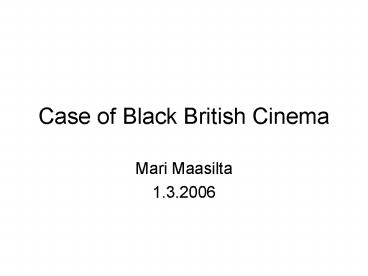Case of Black British Cinema - PowerPoint PPT Presentation
1 / 17
Title:
Case of Black British Cinema
Description:
It might be an empirical analysis of one the films screened in the end of the ... rise of anti-fascist movements (Rock Against Racism, Anti-Nazi League) ... – PowerPoint PPT presentation
Number of Views:45
Avg rating:3.0/5.0
Title: Case of Black British Cinema
1
Case of Black British Cinema
- Mari Maasilta
- 1.3.2006
2
Requirements for passing
- Active participation in the lectures and writing
the final essay. - The final essay is based on the lectures, course
readings and the films. It might be an empirical
analysis of one the films screened in the end of
the course or a theoretical reflection of one of
the topics of the course by using empirical
examples from the films. - The essay should be 5 to 10 pages.
- The essays have to left in the post box of the
teacher (main building Kalevantie 4, C258) not
later than March 20.
3
Possible issues
- The displaced identity of the filmmaker and its
influence on his/her production. - Alternative production modes of transnational
cinema and their influence on the film. - Authenticity dicourse vs. hybridity discourse in
the film.
4
More possible issues
- What kind of identity positions does the film
propose? - What kind of idology does the film propose?
- What kind of genre contract does the film
propose?
5
Structure of the paper
- Aim of the paper research question
- Main concepts, theoretical framework
- Empirical analysis
- Conclusion
- Literature
6
General rules for essay writing
- define your main point what is the aim of your
essay? - do not underestimate your own opinions and
experiences but justify your claims and arguments - give evidence empirical examples, facts
- be exact references to literature
7
Black British Cinema
- films made by film-makers of Asian, African and
Caribbean diaspora - deal with the British-Asian, British-African or
British-Caribian experience - emerged in the context of politics of
multiculturalism in the beginning of 1980s
8
British political and social context of 1980s
- Thatcherist right-wing policy since 1979
- rise of anti-fascist movements (Rock Against
Racism, Anti-Nazi League) - politicisation of Blackness
9
The first wave Cinema of duty films
- Social issues
- Documentary-realist style
- Direct relation to social crisis
- Attempts to articulate problems and solutions
to problems within a framework of centre and
margin, white and non-white communities - Aims to tell buried or forgotten stories, to
write unwritten histories and to correct the
misrepresentations of the mainstream - A demand for positive immigrant images
10
Black British Collectives
- were born as a consequence of social
unrestlessness and riots against police
harassment, racism, and unemployment in the late
1970s and early 1980s - Finance from Greater London Council (until 1986)
and Channel Four Television - Purpose to train minority artists to produce
their own self-representational films and videos
11
- ethnic collectives
- Black Audio Film Collective, Ceddo Film and Video
Workshop, Sankofa Film and Video Collective (West
Indies) - Retake Film and Video Workshop (India and
Pakistan) - common features
- challenge conventional forms of representation
length requirements, collage techniques,
collective directing, often documentaries - trained several ethnic and identity filmmakers
operating nowadays as individual filmmakers
12
Handsworth Songs (John Akomfrah and Black Audio
Film Collective , 1986, documentary)
13
Territories (Isaac Julien, 1984, documentary 25
mins)
14
The second wavePopulist Black British films
- from the middle of 1980s
- no simple focus on racial politics, acknowledge
the complexity of identity politics (race, sex,
gender) - complexity of style, genre and film form
- use popular culture and music as references
15
My Beautiful Laundrette (Stephen Frears, 1985)
16
The Buddha of Suburbia (Roger Michell, 1993)
17
Bend it Like Beckham (Gurinder Chadha, 2002)































